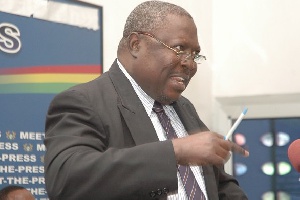 Martin Amidu is the Former Attorney General and Minister of Justice
Martin Amidu is the Former Attorney General and Minister of Justice
Former Attorney General and Minister of Justice, Martin Amidu, has descended heavily on Samuel Bright Acquah, the Circuit Court judge who denied the Bono Regional Chairman of the New Patriotic Party (NPP), Kwame Baffoe, popularly known as Abronye DC, bail.
In a statement sighted by GhanaWeb, on September 16, 2025, Amidu, who is Ghana’s first Special Prosecutor, described the reasons given by the judge for denying Abronye bail for a second time as a disgrace to the legal profession and the bench.
He asserted that the ruling of the judge raises questions about how he became a lawyer, let alone a justice of the Circuit Court of Ghana.
Judge who twice remanded Abronye retires – Report
“The published certified copy of the ruling of His Honour Samuel Bright Acquah in the case of The Republic v Kwame Baffoe @ Abronye, particularly from pages 8 to 10 of the ruling, constitutes a disgrace to the legal profession and the Judicial Service of Ghana. The depth of research, learning, the language used, and the writing style are not only porous but unbefitting to be part of a long essay of a final-year law student on the conditions under which a court may grant or refuse bail to any suspect.
“The question that immediately came to my mind was whether Judge Samuel Bright Acquah was a fit and proper person to have been enrolled on the Roll of Lawyers in Ghana in the first place. How could such a person have passed through the legal education system and been called to the Bar? How did such a person become a Circuit Court judge in Ghana, even if he slipped through the Roll of Lawyers?” he quizzed.
The former Special Prosecutor indicated that the ruling of the judge violates the provisions of the 1992 Constitution of Ghana on the protection of the freedoms of the citizenry and also the presumption of innocence of accused persons.
“Ordinary laymen are taught from elementary school about the presumption of innocence of suspects and the burden on the prosecution to prove its case beyond reasonable doubt, at a fair trial before a court of law. The grounds on which a court may grant bail to suspects are well known to the general public with any basic education. It is trite that bail must not be punitive or excessive.
“Chapter Five of the 1992 Constitution spells out clearly the fundamental human rights and freedoms of the citizen, including the protection of personal liberty (Article 14), respect for human dignity (Article 15), equality and freedom from discrimination (Article 17), and a fair trial with the concomitant right to the presumption of innocence (Article 19). One does not need a law degree to know these rights of the citizen,” he added.
He also pointed out that the examples cited by the judge in his ruling show that he had been consistently violating the “rights of citizens to bail on extra-judicial grounds and as a punishment contrary to the citizen’s freedom and right to be presumed innocent.”
Watch as Abronye is released after meeting bail conditions
Judge Bright Acquah was heavily criticised for denying Abronye bail for a second time on Friday, September 12, 2025, and remanding him for seven days.
Renowned legal practitioners and politicians from both the NPP and the ruling National Democratic Congress (NDC) have condemned the decision.
Many, including the Ghana Bar Association, have said that even though Abronye’s action is unacceptable, the judge’s refusal to grant him bail over the charge of misbehaviour is equally condemnable.
The judge’s use of a quote from Idi Amin, which he wrongly attributed to Robert Mugabe, and the “non-equality” principle in George Orwell’s famous Animal Farm text, also drew a lot of criticism.
Read Amidu’s full write-up below:
BAI/VPO
Will Ghana pass the Anti-Witchcraft Bill? Find out in the latest episode of The Lowdown on GhanaWeb TV in this conversation with Amnesty International:
[embedded content]
